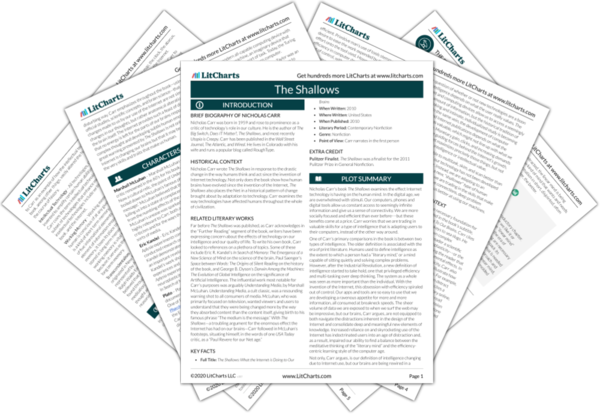Carr decided to write The Shallows after becoming concerned about his own capacity to focus. A decade earlier, before he started to use the Internet daily, Carr had no problem staying put with a long novel or concentrating on a singular task. Recently, though, he found himself constantly distracted by a compulsion to check his email or his RSS or his Twitter feed. Carr maintains that his own case is symptomatic of a global, Internet-induced epidemic that teaches all of us to be distracted.
Carr then diagnoses the causes of this epidemic. Before the digital age, learning required the student to develop an intimate and focused relationship with the object of their study. Students trained themselves, when learning, to “block out” the normal, human, primal instinct to scan our surroundings. With enough practice, we could override the primal instinct telling us to constantly divert our attention lest we miss an opportunity or fall prey to danger. This mental evolution marked the birth of the literary brain, in which humans could meditate on a single task and developed individualized relationships with their own education.
In the digital age, Carr argues, the opposite is true. Carr shows how widespread modern problems with attention span are not arbitrary, but can be directly linked to our inundation with stimuli in the information age. The Internet, in Carr’s words, is an “ecosystem of interruption technologies,” rewiring our brains to seek immediate rewards and move quickly on to the next piece of stimulus. The very systems we have created to enhance our human abilities and make progress are now teaching us, again, to give in to distraction. Carr’s thrust is that digital lifestyles not only provide an endless playground for procrastination and distraction when in use, but that they also have lasting effects. He argues that Internet use atrophies our ability to focus in all areas of our life––even when we are not online.
Distraction and Focus ThemeTracker

Distraction and Focus Quotes in The Shallows
Whether I’m online or not, my mind now expects to take in information the way the Net distributes it: in a swiftly moving stream of particles.
Calm, focused, undistracted, the linear mind is being pushed aside by a new kind of mind that wants and needs to take in and dole out information in short, disjointed, often overlapping bursts––the faster, the better.
To read a book was to practice an unnatural process of thought, one that demanded sustained, unbroken attention to a single, static object. It required readers to place themselves at what T.S. Eliot, in Four Quartets, would call “the still point of the turning world.”
We don’t see the forest when we search the Web. We don’t even see the trees. We see twigs and leaves.
[The book] loses what the late John Updike called its “edges” and dissolves into the vast, roiling waters of the Net. The linearity of the printed book is shattered, along with the calm attentiveness it encourages in the reader.
In arguing that books are archaic and dispensable, Federman and Shirky provide the intellectual cover that allows thoughtful people to slip into the permanent state of distractedness that defines online life.
In the choices we have made, consciously or not, about how we use our computers, we have rejected the intellectual tradition of solitary, single-minded concentration, the ethic that the book bestowed on us. We have cast our lot with the juggler.
It’s possible to think deeply while surfing the Net, just as it’s possible to think shallowly while reading a book, but that’s not the type of thinking the technology encourages or rewards.
When it comes to the firing of our neurons, it’s a mistake to assume that more is better.
What we are experiencing is, in a metaphorical sense, a reversal of the early trajectory of civilization: we are evolving from being cultivators of personal knowledge to being hunters and gatherers in the electronic data forest.
The Net is making us smarter…only if we define intelligence by the Net’s own standards.
Every click we make on the Web marks a break in our concentration, a bottom-up disruption of our attention––and it’s in Google’s economic interest to make sure we click as often as possible.
The irony in Google’s effort to bring greater efficiency to reading is that it undermines the very different kind of efficiency that the technology of the book brought to reading––and to our minds––in the first place.











